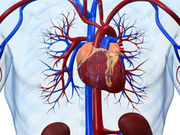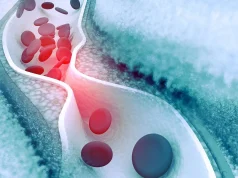Treatment linked to improved long-term survival, regardless of underlying kidney function
FRIDAY, April 8, 2016 (HealthDay News) — For acute myocardial infarction (AMI) survivors, angiotensin-converting enzyme inhibitor (ACEI) and angiotensin receptor blocker (ARB) treatment is associated with improved long-term survival, according to research published in the April 12 issue of the Journal of the American College of Cardiology.
Marie Evans, M.D., Ph.D., from the Karolinska Institutet in Stockholm, and colleagues examined discharge and continuous follow-up data on ACEI/ARB use among AMI survivors (2006 to 2009) from a large Swedish registry.
The researchers found that 45,697 patients (71 percent) were treated with ACEI/ARB. Overall, the three-year mortality was 19.8 percent (17.4 and 25.4 percent among users and non-users, respectively). Survival was significantly better for patients treated with ACEI/ARB in adjusted analysis (three-year hazard ratio, 0.80), with survival benefit consistent across all kidney function strata, including dialysis patients. The three-year risk for myocardial infarction was lower for those treated with ACEI/ARB (hazard ratio, 0.91), while no significant effect was seen for stroke risk. In general, the crude risk for acute kidney injury (AKI) was low (2.5 for treated and 2.0 for non-treated patients), and was similar across categories of estimate glomerular filtration rate; the risk was significantly higher with ACEI/ARB treatment. ACEI/ARB treatment was favored for the composite of AKI and mortality.
“Treatment with ACEI/ARB after AMI was associated with improved long-term survival, regardless of underlying renal function, and was accompanied by low rates of adverse renal events,” the authors write.
Several authors disclosed financial ties to the pharmaceutical industry.
Full Text (subscription or payment may be required)
Editorial (subscription or payment may be required)
Copyright © 2016 HealthDay. All rights reserved.








